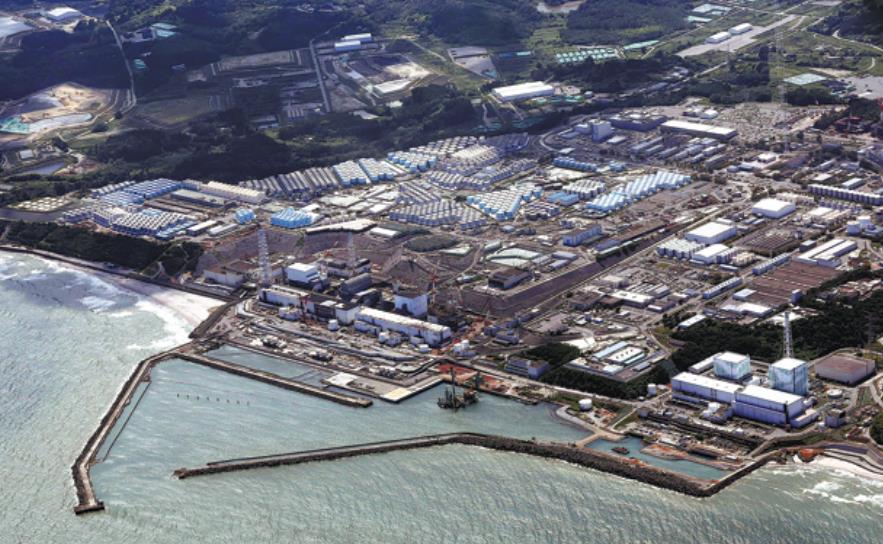People from Japan, South Korea stage demonstrations, air concern over harm to fishing industry
Editor's note: Despite worldwide opposition, Japan went ahead with its nuclear-contaminated water discharge plan. This page examines the concerns and protests raised by residents, environmental advocates and regional neighbors.

A university student is held back by the police on Thursday while attempting to break into the Japanese embassy in Seoul, after Japan released nuclear-contaminated water from the wrecked Fukushima Daiichi Nuclear Power Plant into the Pacific Ocean. KIM HONG-JI/REUTERS
The Japanese government and the Tokyo Electric Power Company should halt the discharge of nuclear-contaminated water from the crippled Fukushima plant immediately, said protesters in Japan and South Korea after Japan started the release on Thursday.
Despite widespread opposition, Japan started the release of nuclear-contaminated water into the Pacific Ocean, as planned, at about 1 pm local time. TEPCO, operator of the Fukushima Daiichi Nuclear Power Plant, plans to carry out the first batch of release over 17 days to discharge 7,800 metric tons of toxic water.
A rally was held in front of TEPCO headquarters in Tokyo on Thursday. Kenichi Kitamura, a resident of Kawasaki in Kanagawa Prefecture, urged the Japanese government to order TEPCO to stop the discharge. They should take responsibility and store the nuclear-contaminated water on land instead, he said.
"Japan brought tremendous trouble to the people of Asia during World War II. We killed various people and took away valuable things," Kitamura said. "Now, letting contaminated water flow is nothing but a repetition of such actions."
One of the protesters, Takao Sakurai, 73, raised doubts over the government and TEPCO's claim that the nuclear-contaminated water met the safety standards.
"If they say the contaminated water is safe, then why don't they just drink it themselves instead of releasing it into the ocean?" Sakurai said.
"There are no borders in the ocean. So, if we're talking about stakeholders, it's not just the people involved in the fishing industry in Fukushima. All humans on Earth are stakeholders," he said.
A representative of KOREUMI, a Japanese citizens' conference to condemn further pollution of the ocean, read out a statement during the protest: "The ocean does not belong to TEPCO. It's not exclusively Japan's. Pacific Island countries, as well as ... South Korea and China have voiced significant criticism, and this issue has already become an international problem."
KOREUMI criticized the Japanese government for ignoring the voices of Fukushima residents.
"They proceed without pausing for discussion, determined to discharge at all costs, which is markedly undemocratic," Chiyo Oda and Kazuyoshi Sato, co-directors of KOREUMI, said in a statement.
Decisive blow

An aerial view shows the Fukushima Daiichi Nuclear Power Plant in Fukushima, Japan, on Thursday. KYODO NEWS/ASSOCIATED PRESS
"This action once again puts fishermen and victims of the nuclear disaster in dire straits. This will deal a decisive blow to Fukushima's fishing industry, and consumers will likely exercise justified caution by refraining from purchasing," they said.
Speaking of Japan's insistence on selecting the ocean discharge plan from several options, Zhang Yulai, vice-president of the Japan Institute of Nankai University, said that because of Japan's history as an island country, "a strong sense of crisis often outweighs moral principles and becomes the standard for government decisions".
Despite strong opposition, the government's decision is "primarily driven by factors, including cost considerations and vested interests between the government and TEPCO", Zhang said.
Environmental and civic groups rallied across South Korea on Thursday, including Seoul, the port city of Busan and the southern island of Jeju, calling for withdrawal of Japan's discharge plan.
South Korea's Prime Minister Han Duck-soo said on Thursday the import ban on fisheries and food products from the Fukushima region will remain in place until the concerns are eased, Yonhap News Agency reported.
Since 2013, South Korea has banned imports of all fishery products from eight Japanese prefectures near Fukushima because of concerns over radiation levels.
All seafood imported will be thoroughly tested for radioactivity, Han said in a statement.
Japan should strictly comply with scientific standards and be transparent in providing information as promised to the international community, Han said.
South Korea's main opposition Democratic Party of Korea proposed bills, including enhancing regulations on place-of-origin labeling, while seeking to designate damage from the water discharge as a disaster and lay the legal groundwork for seeking indemnity from Japan.
Li Ruoyu, a visiting research fellow at the Institute of Japanese and Korean Studies at Sichuan Normal University, said if problems do arise, the first victims will be the Japanese citizens.
"Should unforeseen circumstances occur, the Japanese government will still make efforts to remedy the situation. The problem, however, is that any remedial measures will inevitably be reactive," Li said.
"There will be evaluations after the ocean dumping of nuclear-contaminated water. However, arriving at scientific conclusions takes time, and no remedial measures can undo the damage already caused," he said.
By JIANG XUEQING and YANG HAN


